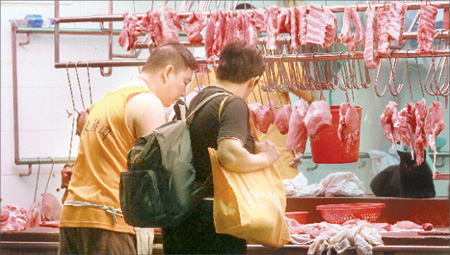Buyers accuse pork importers of price fixing
Updated: 2011-05-05 06:43
By Ming Yeung(HK Edition)
|
|||||||||
|
A customer checks prices at a pork vendor in Tai Po Wednesday. Edmond Tang / China Daily |
The pork buyers union has called on the government to open a live hog market to prevent monopolies from controlling pork prices.
The union, consisting of buyers and meat shops, on Wednesday accused suppliers of jointly manipulating fresh hog supplies in order to reap huge profits.
Since 2007, live pigs have been imported daily from the mainland by three authorized suppliers: Ng Fung Hong Limited, Guangnan Hong Limited and Hong Kong Agriculture Special Zone Limited.
From January 2010 to March 2011, the average wholesale price of live pigs surged 40 percent from HK$1,044 to HK$1,412 for 100 catties, causing retail fresh pork prices to jump from HK$28 a catty to HK$38, the union announced.
The union revealed that the price of wholesale live pigs on the mainland has been fixed at HK$1,200 for 100 catties, but the average wholesale price in Hong Kong stands at around HK$1,400, showing the suppliers are hustling big gains with large commissions and lower expenditures on staff.
Buyers alleged that the price hike was because of unstable supplies of live pigs transported to Hong Kong and the recent pork price fluctuations should be attributed to the "three days normal and four days less" import pattern adopted by the suppliers and their artificial "price-boosting" activities.
"We observed an abnormal practice of live pig supplies in the last six months. Sometimes they import less and we have to bid higher because of limited supply. When the price gets higher, they import more the next day," said Kwan Kwok-wah, vice-chairman of the union, at a media conference on Wednesday.
Because of unpredictable supplies of live pigs the following day, bidders are inclined to secure more stocks at higher prices, thus creating a sense of uncertainty in the market, explained Joe Chan Chi-wang, a member of the union.
Ng Kwok-ming, another member of the union, said: "Three suppliers act like they have some kind of prior agreement. Once one company imports less, the other two will follow suit."
Vice-Chairman Kwan asked: "Day-on-day differences are around 800 live pigs, how can that be possible?"
According to statistics of the Food and Environmental Hygiene Department, the average numbers of daily imported live pigs varied from 4,512 in January to 3,726 in February, the lowest figure in the past 12 months. The number rose to 3,942 in April.
The union said Hong Kong at least needs 4,600 to 4,800 pigs a day to meet the demand and to stabilize bidding price at HK$1,200 for 100 catties.
If the shortage continues, the union expects the retail pork price to increase to HK$42 a catty.
The union called upon the Ministry of Commerce to open the market to all Hong Kong buyers to obtain live pigs directly from mainland suppliers to ensure a stable supply.
Kwan said some meat shop owners are experiencing difficulties at the moment. Raising retail prices will drive away customers; alternatively the shop owners are simply unable to afford the increased wholesale price, Kwan said.
A meat shop owner surnamed Lee said he lost 20 percent of his business in the last three months.
"More customers have opted to buy chilled or frozen meat because it is cheaper," he said, adding he is considering quitting his business.
A spokesman for the Food and Environmental Hygiene Department on Wednesday night however responded that the import of live pigs maintained "sufficient", at about 4,000, during recent months.
The spokesman said the Ministry of Commerce had granted import licenses to two more suppliers in 2007, as a move to open the market, in addition to Ng Fung Hong, the original sole authorized supplier.
The spokesman added that food prices are formulated by the market and the price of live pigs is affected by soaring global food prices, increased demand for internal consumption on the mainland as well as the exchange rate of renminbi.
However, the government will assist the trade in enlarging the food supply channel in order to maintain reasonable food prices, the spokesman said.
Ng Fung Hong and Guangnan Hong made no comment to China Daily Wednesday.
China Daily
(HK Edition 05/05/2011 page1)
